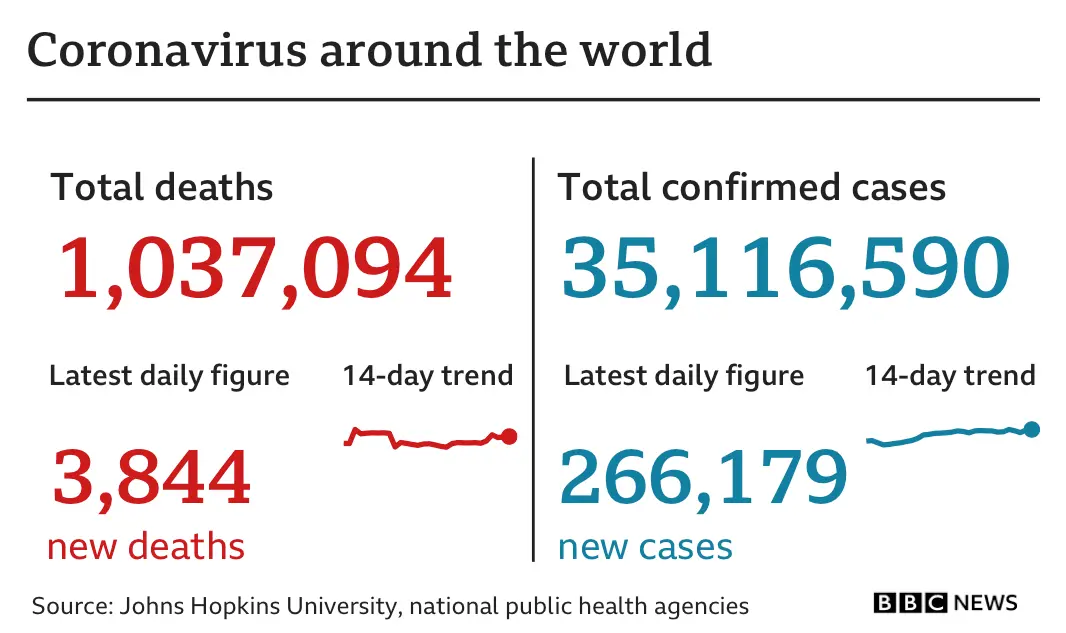Coronavirus: Europe experiencing 'pandemic fatigue'
 Getty Images
Getty ImagesCovid is taking an emotional toll across Europe with rising levels of apathy among some populations, the World Health Organization is warning.
Survey data reveals the scale of this "pandemic fatigue", estimated to have reached over 60% in some cases.
Many people are feeling less motivated about following protective behaviours after living with disruption and uncertainty for months, says the WHO.
Although weary, people must revive efforts to fight the virus, it says.
Until a vaccine or effective treatments are available, public support and protective behaviours - washing hands, wearing face coverings and social distancing - remain critical for containing the virus.
Coronavirus is continuing its spread across the world, with more than 35 million confirmed cases in 188 countries and more than one million deaths.

Dr Hans Henri Kluge, WHO's regional director for Europe, says fatigue is to be expected at this stage of the crisis.
"Since the virus arrived in the European region eight months ago, citizens have made huge sacrifices to contain Covid-19.
"It has come at an extraordinary cost, which has exhausted all of us, regardless of where we live, or what we do. In such circumstances it is easy and natural to feel apathetic and demotivated, to experience fatigue.
"I believe it is possible to reinvigorate and revive efforts to tackle the evolving Covid-19 challenges we face."
He says there are strategies to get us back on track, with communities at their heart:
- Understand people by measuring public opinion regularly and acknowledge their hardship
- Involve communities in discussions and decisions as part of the solution
- Allow people to live their lives, but reduce their risk by looking at innovative ways to meet continuing societal needs - for example, delivering meals to vulnerable people or organising virtual catch-ups
He highlighted virtual celebrations during Ramadan or floating cinemas as successful new approaches that could help people adapt to the new conditions imposed by the pandemic.
The UK does its own regular survey on coronavirus and social attitudes and behaviours, based on a poll of around 2,200 adults.
Latest data suggests:
- nearly nine in 10 adults across Great Britain say they have enough information about how to protect themselves against Covid - similar to June
- eight in 10 who have met up with others say they have always or often maintained social distancing - similar to July
- more than nine in 10 adults say they use a face covering to slow the spread of coronavirus - again, similar to July

- TESTING: How do I get a virus test?
- SYMPTOMS: What are they and how to guard against them?
- LOOK-UP TOOL: How many cases in your area?
- YOUR QUESTIONS: We answer your queries
- THE R NUMBER: What it means and why it matters
- TREATMENT: How close are we to helping people?

YouGov also tracks public attitudes and says the majority of people are still supportive of restrictions and measures to reduce the spread of the virus, based on surveys of more than 1,600 adults.
Strongest support comes for the measures that are less restrictive on groups of people meeting, with 85% supporting the toughened rules around wearing face masks, the advice to work from home when possible (85%) and pubs operating with table service only (82%).
Support for other measures is slightly weaker, though closing pubs at 22:00 (69%), reducing capacity at weddings (62%) and limiting indoor sport to six people (61%) are all still backed by a majority of the British public.
Disapproval of government handling of Covid continues to rise, however. Around 65% now say the government is doing a bad job, compared with 20% in late March when the country went into lockdown.

- LIVING WITH BULIMIA: Freddie Flintoff goes on a personal journey
- COVID-19: What can we expect the winter to look like?

